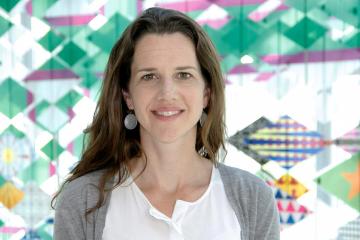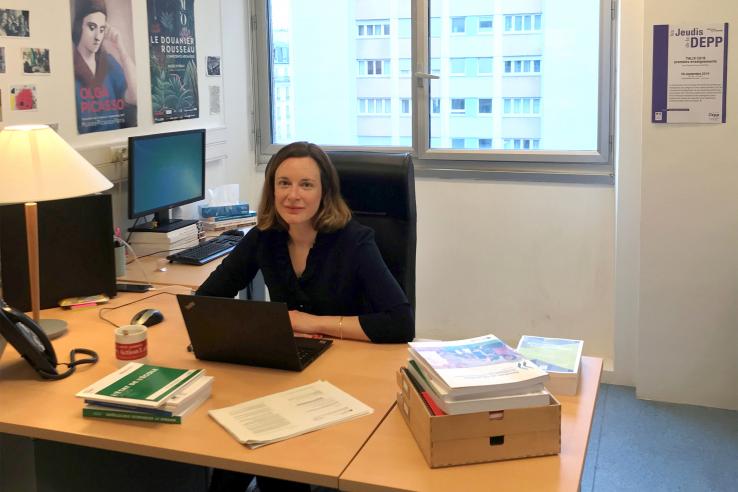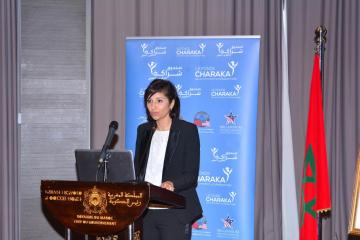
Alumni Voices from Government: Axelle Charpentier '14, French Ministry of Education

Formerly a research manager at J-PAL Europe, Axelle Charpentier '14 now leads education policy and practice research at the French Ministry of Education. She describes her journey from J-PAL to government in this post in the Alumni Voices from Government series.
Could you tell us about your current role and how you arrived at this position?
I currently head the office in charge of the evaluation of educational policy measures and studies on teaching practices at the French Ministry of Education (Direction de l'Évaluation, de la Prospective et de la Performance (DEPP)). The DEPP produces statistics and studies on the French education system in order to contribute to the public debate, help steer educational policies, and evaluate the education system in all its dimensions (evaluation of students, schools, interventions/policies and the system as a whole).
I first came to learn about the DEPP’s work during my time at J-PAL Europe. Between 2010 and 2014, among other things, I was a research manager of a randomized evaluation designed to test the impact of a boarding school on the educational outcomes and well-being of disadvantaged children in France. Some of my current colleagues at the DEPP created the cognitive tests that we used to measure students’ academic abilities for this evaluation ten years ago!
My office at the DEPP studies teaching practices. Our work attempts to open what some call the "black box" of the classroom by providing nationally representative snapshots of teachers' professional practices and monitoring potential changes in relation to the evolution of training policies, for instance. For example, we recently released publications describing in great detail the didactic and pedagogical choices made by math teachers in primary and middle schools, providing insights to understand French students’ performance in international surveys like PISA or TIMSS.
My job at the DEPP has also allowed me to take on more responsibility and to develop leadership skills. On a daily basis, I coordinate the work of a team of thirteen people with varied profiles—eight of them are economists or sociologists, and five are teachers by training—and diverse portfolios that range from survey and evaluation design and implementation, to the analysis and dissemination of results.
In addition to my management role, one key aspect of my work is the effective communication of results. I take great pleasure in writing outreach publications. One of our challenges is to make these results known to the actors of the education system to ultimately inform national policies on teacher training in particular.
How has your experience at J-PAL informed your work today?
At J-PAL, I acquired hands-on knowledge and experience on the most rigorous method of public policy evaluation. I continue to promote randomized evaluations, even if many of the interventions we evaluate at the DEPP are not well suited for this type of evaluation (as shown for example by our recent evaluation of the 2015 Digital Plan).
I also have the opportunity to closely follow some of J-PAL’s long-term research projects in which I was involved more than ten years ago. The DEPP regularly collaborates with academic researchers who use our data (administrative data in particular) to carry out longitudinal studies that follow students over the long term, for instance. Improving access to high-quality administrative data is an extremely promising way to enhance a culture of evidence-informed policy.
It was at J-PAL that I began to develop an expertise in education. I rely on this knowledge in my daily work, and keep developing it through working with my colleagues who produce data at the DEPP, field practitioners, and researchers involved in our studies.
My experience as a research manager at J-PAL has also given me strong data collection and team management skills (although in the latter area I have made a lot of progress since I took the job at the DEPP at the end of 2018). Lastly, the research projects I worked on taught me how to disseminate methods and results to a wide variety of audiences. These are very useful skills in my daily work!
How do you engage with evidence generation or use in your current role?
At the DEPP, we produce two types of results: causal results and descriptive or correlational results. Causal results are crucial for designing effective public policies. In this respect, J-PAL Europe’s researchers, in conjunction with the DEPP, have conducted groundbreaking work to inspire evidence-based educational policies in France.
However, detailed descriptive knowledge of existing learning and teaching conditions is also essential to contextualize other types of evidence, including impact evaluations, as well as to develop appropriate measurement instruments that can be used in impact evaluations. This is one of the important inputs of my office and more broadly of the DEPP.
The DEPP is recognized as an important player in France’s educational research landscape. One of the aspects I like the most is that it is a place where the expertise of the DEPP’s data producers can be combined with that of school actors and researchers (including several J-PAL affiliated researchers).
Several colleagues work part-time at the DEPP and the rest of the time in schools as teachers or school principals. They bring up-to-date, hands-on knowledge that helps improve the design and relevance of our surveys and evaluations.
We also benefit from collaborations with researchers from various disciplines (economists, sociologists, psychologists, educational specialists, etc.). This diversity of viewpoints is likely to strengthen the relevance and legitimacy of our work among all education stakeholders.



